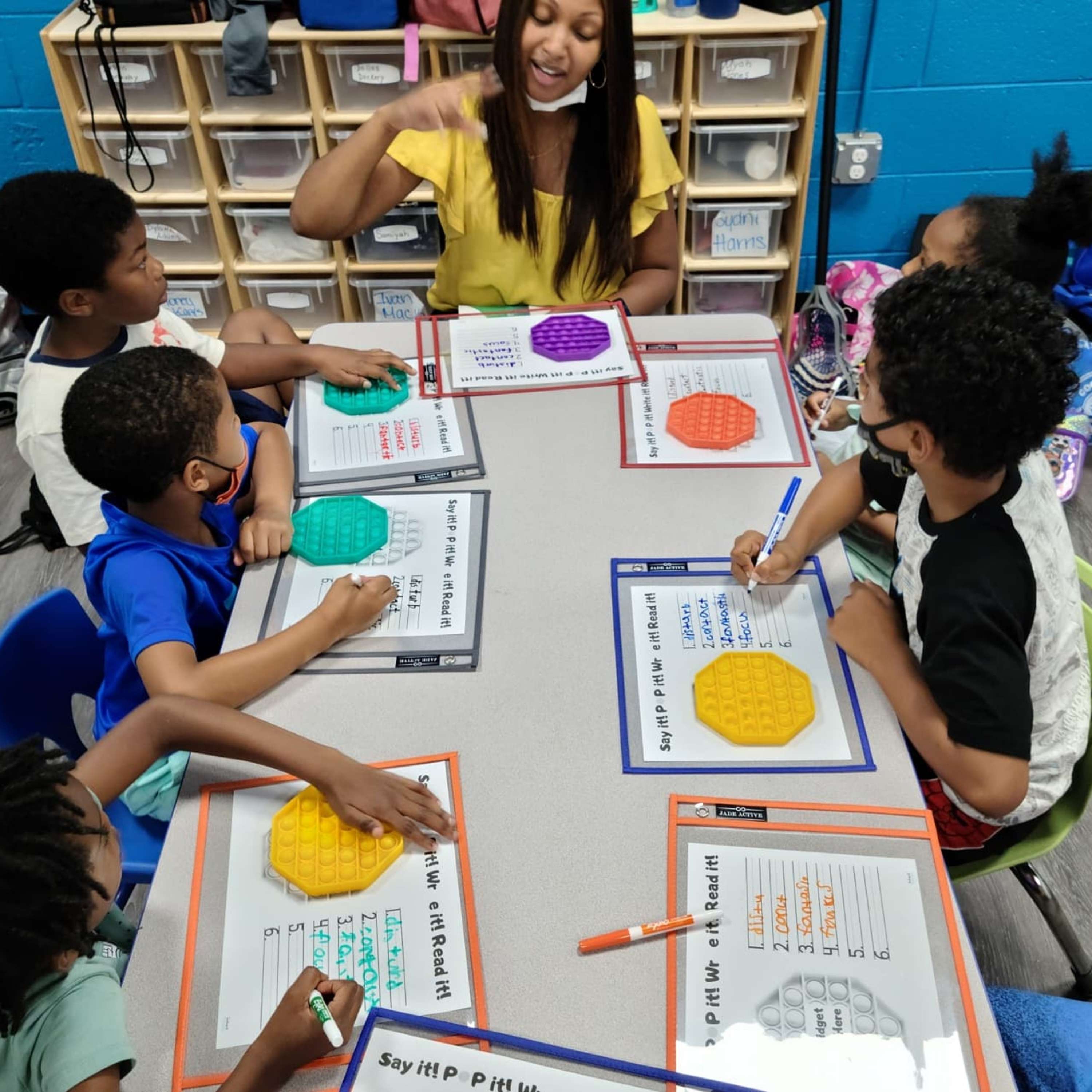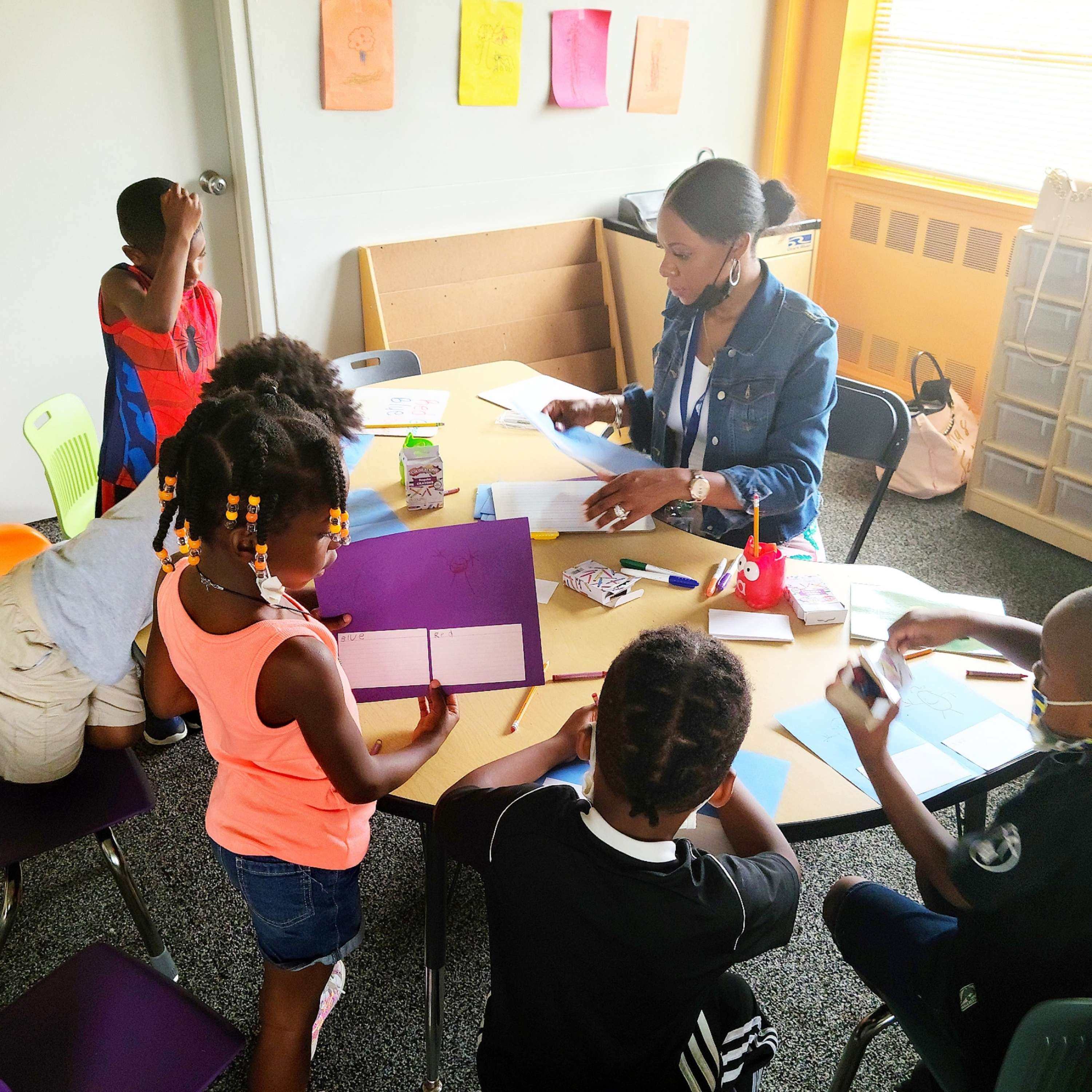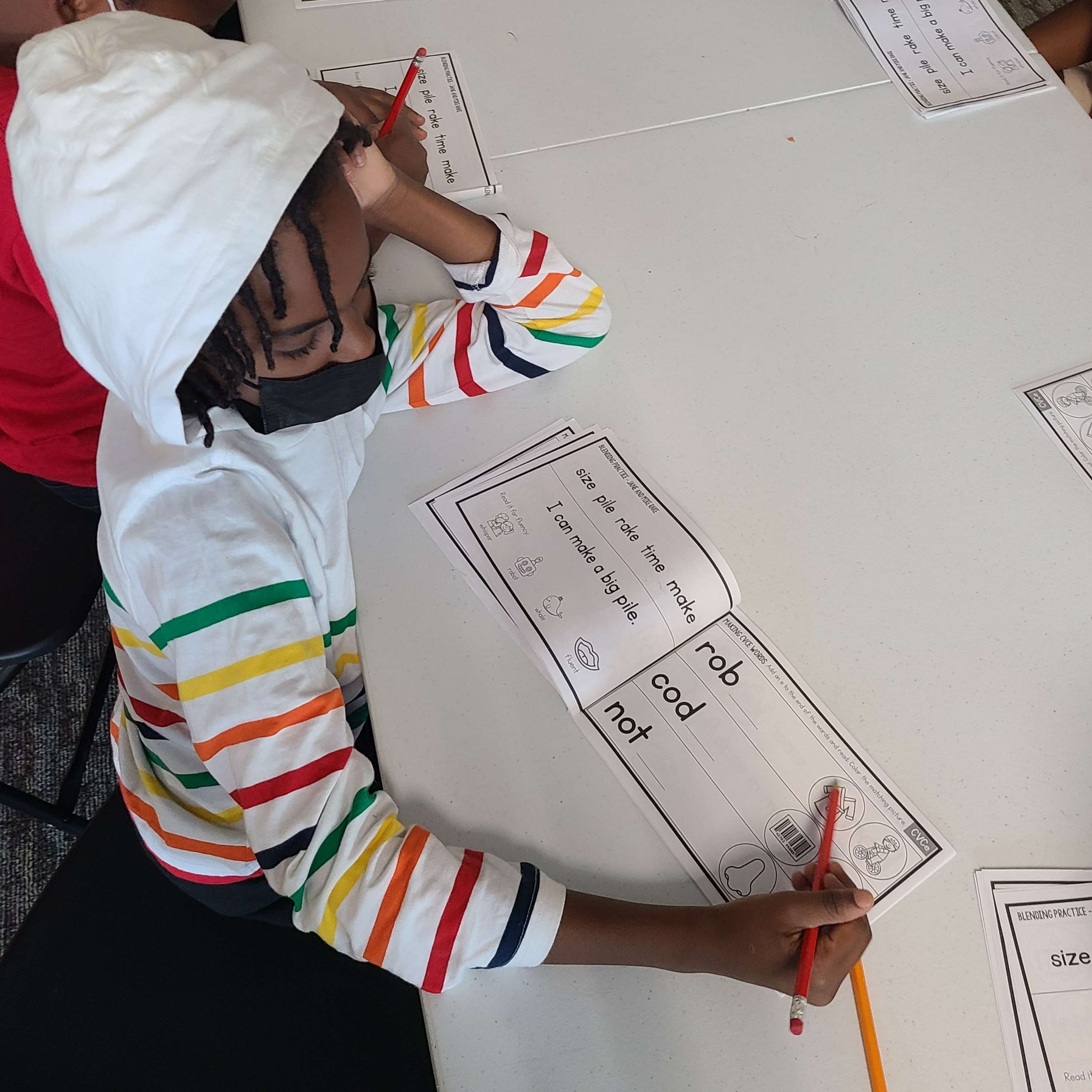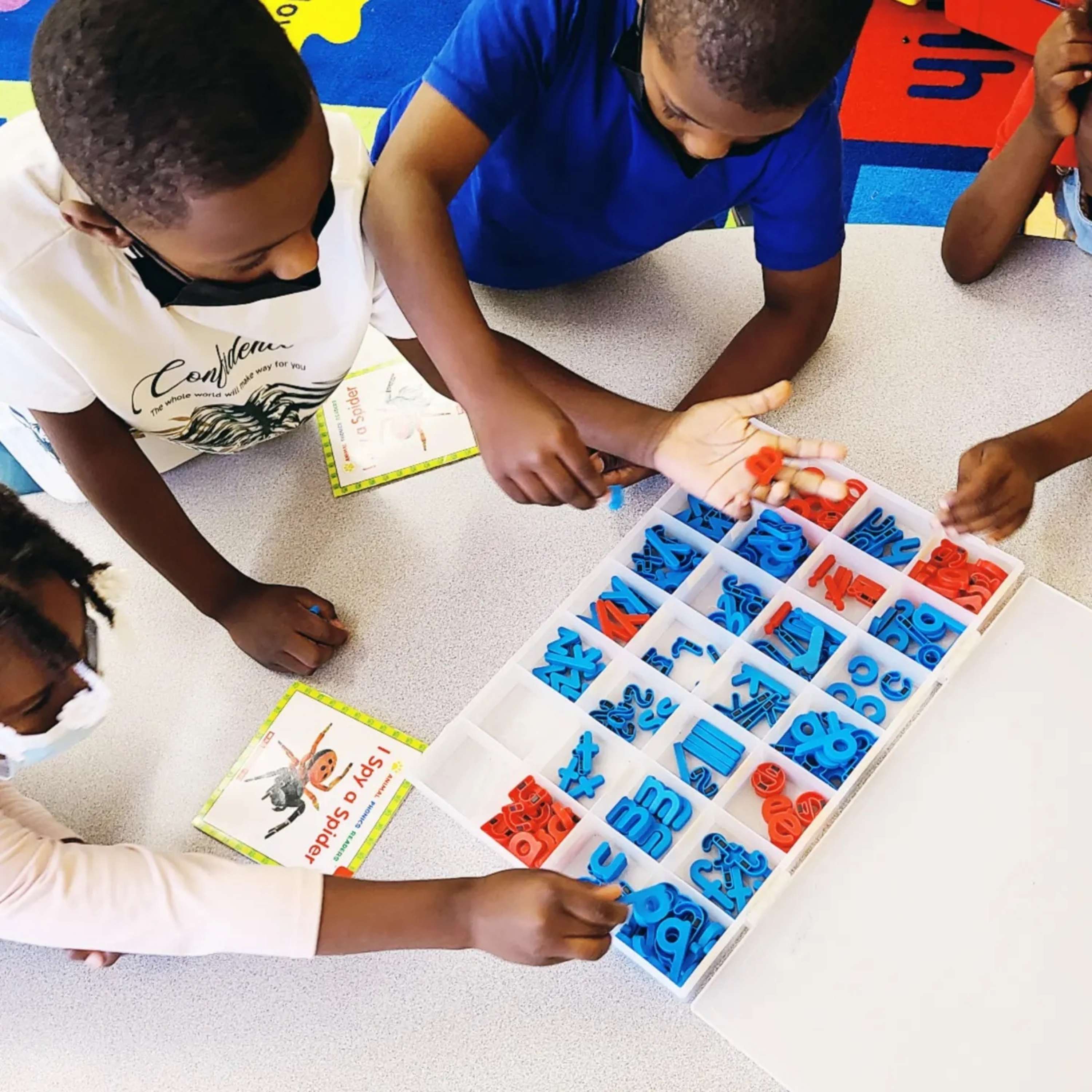Social media connection leads alumnae to launch Love of Literacy Foundation
Social media allows us to connect with people from countries around the world. In some cases, it helps us build relationships with people right in our own community.
Tiffany Ward and Candice Williams both grew up in Detroit, attended Cass Technical High School, earned degrees at Wayne State and worked in the same school system. Despite being in the same spaces, they never crossed paths until their passion for teaching reading and pursuit of “edupreneurship” — or the establishment of an education-related business — brought them together.
Defeating difficulties with determination
Ward aspired to be a teacher from an early age.
“When I was five, I was recorded saying I wanted to be a teacher,” she said. “I had an imaginary class of students.”
Growing up on the east side of Detroit, her parents wanted to make sure she and her sister had the best of everything. She attended Detroit Public Schools from kindergarten through 12th grade, and she said many of her teachers confirmed her career choice.
“As I was going through school, I met many great educators,” she said. “They inspired me to teach because they cared about me and my education. I wanted to have a similar impact and influence on children.”

Ward decided to pursue a degree in English with a minor in elementary education at the same university her sister attended. Then, the unexpected happened: Her roommate stabbed her. Ward had to have reconstructive surgery and nerve repair. She took a couple weeks off during winter vacation to heal, physically and mentally, but returned right back to school and earned her bachelor’s.
After graduation, Ward returned home to Detroit, where she worked in retail management and as paraprofessional in the Highland Park Schools.
“Because of the incident, I did not earn my teaching certificate as planned, but I knew I had to return to school if I wanted to be a teacher,” she said. “It was a challenging time, but I was determined not to let anything stop me. It wasn’t easy, particularly because I took a break and had to mentally prepare myself to return to school.”
Ward applied to several local colleges and universities, including Wayne State.
“I was familiar with Wayne State because I had taken an algebra course on campus when I was in eighth grade, and it was a really great experience,” she said.
Ward learned about TeachDETROIT, an intensive 18-month urban teacher residency program that prepares participants to teach in the Detroit Public Schools Community District. She became part of the first cohort.
“It was an excellent program, and I was happy to be part of it,” she said. “I made some great connections and met some wonderful people, many of whom I am still in contact with to this day.”
Ward said TeachDETROIT was unique because it allowed aspiring teachers to learn, practice and obtain feedback on the skills they needed to become effective educators.
"We met with our professor, then prepared and executed our lesson plans in our actual classrooms,” she said. “We recorded ourselves and gave one another feedback. That was the most important piece because we learned something, then had the opportunity to apply that new knowledge and skills immediately. That is particularly important — especially if you haven’t been in a classroom before.”
Ward encourages people who want to become teachers to do their research and find a program that is a good fit, meets their needs and accommodates their schedule.
“Today’s teacher preparation programs are different,” she said. “Some are online, and some are shorter. I chose TeachDETROIT because it allowed me to be more flexible with my schedule and offered courses that were integrated into schools. I could take classes while working with students in the classroom.”
After earning her Master of Arts in Teaching in elementary education, Ward began teaching at University Prep Schools. She became a first-grade teacher at Bunche Academy three years ago. Last year, Ward launched Teaching at Tiffany’s, a business through which she creates resources for other teachers. Many of the activities she designs and develops are hands-on, fun and engaging for students so they can understand and practice concepts they are learning, whether they are working one-on-one with a teacher or in groups.
Ward, who recently earned a master’s in literacy studies with an endorsement as a reading specialist, noted that while being a teacher is not easy, it is worth the reward.
“We work very, very hard — especially those of us who are passionate about what we do,” she said. “But there is no feeling like seeing students light up when they are learning or having parents tell you about the positive influence you have had on their children’s lives. It is a job that requires the heart. You must care.”
Turning a mess into a message
Growing up, Williams always wanted to be a teacher. “I played school with my stuffed animals and my cousins and friends,” she said. “I looked at teaching as a wonderful way to inspire, and I always had a desire to work with kids.”

A native Detroiter, Williams was raised in a single parent, low-income household. She said that although they didn’t have much and she experienced difficulties, she knew education could change the trajectory of her life.
“Other students might not have had the same challenges, and they might not have come from the same background as me, but we were all at the same table,” she said. “If I was going to keep my seat at the table, I had to go to college.”
Williams applied to several colleges but did not get accepted. In addition, her mother was afraid to send her to school out of state. Then, Wayne State came to Cass to recruit potential students.
“I got accepted to Wayne State, but my test scores were so low, I had to go through a program called DCE,” she said. “It was a college readiness program for students who weren’t quite prepared for college. I was blessed. Wayne State was in the city, and my mother was comfortable with it.”
Williams faced many obstacles during her educational journey. She had to take two years of developmental courses before she could start taking classes that would count toward her degree program, she gave birth to her son, and she watched as the friends who had begun the DCE program with her dropped out, leaving her alone. However, Williams not only earned a bachelor’s in elementary education, she also earned a master’s in education with a concentration in reading.
“I noticed I was the only African American still there, so I had to motivate myself,” she said. “I graduated from my undergraduate program with a 3.3 and the master’s one with a 3.6. I was so proud of myself because I felt like an underdog, and I was on my college journey on my own. My friends dropped out, and I didn’t have a college roommate.”
After graduation, Williams taught in the classroom for six years before becoming a reading specialist at University Prep Science and Math Elementary - Miller Campus, where she supervised the reading department.
“When I started working with kids and saw the struggles, challenges and gaps, that is when it came alive,” she said. “We need more programs in place to help kids become better readers.”
When the Read by Grade Three Law passed, Willams began wondering what she could do to address the gap and make an impact. She started building online courses and sharing sessions she taped of herself working with her son to build his literacy skills. Then, she started coaching other parents. Williams launched Urby Education in 2018, which she describes as a global education consulting business that focuses on literacy. Urby Education offers in-person, live and on-demand engaging and effective reading intervention services to schools and families.
“Families can obtain lessons and practice reading and other foundational skills that may not be emphasized in school,” she said. “I also share strategies and resources on social media and partner with other organizations. This means that children from anywhere can access Urby’s lessons at any time.”
Williams recently quit her job to pursue entrepreneurship full time. She credits her time at Wayne State for giving her the courage to follow her dreams.
“I am from Detroit, and I want to work here — this is where I want to pay it forward,” she said. “Wayne State had the rigor, focus on diversity and mission to improve urban education. Back then, I wondered why the program couldn’t be simpler, but looking back, I understand why it was so rigorous. It built my character, perseverance, ambition, leadership and organizational skills.”
Today, Williams uses her story to inspire others. She advises students who need academic or financial support to communicate with their advisors, to seek out available resources and programs at Wayne State and in the community, and to look for grants, scholarships and other programs that might provide tuition assistance.
“Ask for help when you need it, believe in yourself and know that anything is possible,” she said. “Sometimes, you may have to work harder so you don’t fall through the cracks. You may have to read the chapter twice or learn how to balance school and part- or full-time work. But you cannot give up.”
“I turned my mess into a message, and others can, too,” she continued. “The best decision I ever made was to attend Wayne State and graduate. There was no other way for me to rise above poverty. This was my path and my dream, and I encourage others to follow their dreams.”
Launching the Love of Literacy Foundation
Ward sent a message to Williams on Instagram letting her know how much she admired her content, which focused on her work as a reading specialist. Williams noted that the admiration was mutual, and the pair expressed interest in collaborating on a future project.
“Candice encouraged me to check out her website for Urby Education,” said Ward. “That was when I realized she was from Detroit. At that time, I was working at University Prep — and she was, too. We discovered we had a lot of similarities, including a love of literacy and a desire to spread that joy to kids and parents in the community.”

“It was so ironic,” said Williams. “Tiffany reached out to tell me she loved what I was doing, and we discovered we had a lot in common. Where are you from? Detroit. Where do you teach? U Prep. We both had a desire to work with kids in the city because they often need more than just what is provided in schools. We began talking about opening a literacy center, where they could come and receive hands-on support and parents could get training.”
The pair began working together during the pandemic, and the Love of Literacy Foundation was born. A 501(c)(3) nonprofit, the foundation seeks to help at-risk children develop a love of literacy by providing hands-on early literacy resources and creating opportunities for the community.
The foundation held its first summer program last year through a partnership with the Detroit Public Schools Community District and Diversified Community Services. More than 20 K-2 students focused on reading foundational skills, while 25 third to seventh graders worked on word study and comprehension strategies.
This summer, the Love of Literacy Foundation expanded its program and hired literacy facilitators. Williams and Ward recruited long-term substitutes, certified teachers, reading specialists and student teachers to facilitate literacy lessons. The foundation partnered with Diversified Community Services, SAY Detroit Play, Healthy Kids and Tindal Activity Center. Sponsor Really Good Stuff provided the foundation with hands-on reading resources for more than 75 children in pre-kindergarten through fifth grade. With four literacy facilitators and two summer camps, the foundation helped support children during COVID learning loss.
“We used magnetic letters, books, puzzles and games to build students’ skills,” said Ward. “Participants used fidget poppers to pop out letter sounds and read with music. We teach by connecting learning with topics and tools that interest students.”

In addition to increasing literacy among young children, the duo plans to help provide prospective teachers with the training, experience and confidence they need to manage a classroom.
“Many new teachers indicate they do not feel prepared to teach or they are unsure of how to teach children how to read or how to effectively support striving readers,” Williams said. “They have taken all these classes, graduated, and are now working in the classroom but are not sure what is going on or what they should be doing. Teachers are leaving the industry in droves, and novice teachers need more support. Our Literacy in Training initiative seeks to help resolve these issues.”
Literacy in Training — or what Ward and Williams refer to as “LIT” — is an apprentice program that offers high school and college students who are interested in becoming teachers the opportunity to learn the science of reading and strategies for working with small groups of students to achieve desired outcomes. Future educators are trained by literacy experts and gain experience in the field before they become student teachers, which helps ensure they are better prepared to provide reading instruction. Participants may also receive stipends, networking opportunities and free classroom resources.
“Our goal is to inspire youth and uplift our communities by providing high quality literacy resources,” said Ward. “Children must develop a love of literacy before they are expected to meet and beat the common core standards in schools. Whether it’s through the Love of Literacy Foundation, Teaching at Tiffany’s or Urby Education, we are providing resources and services to support children in becoming more confident readers.”
“Like many struggling readers, we faced challenges that might have seemed insurmountable,” said Williams. “We fought to overcome them. We didn’t let those difficulties define us or derail our dreams. We are ‘Warrior Strong,’ and we hope to show the next generation that they are, too.”